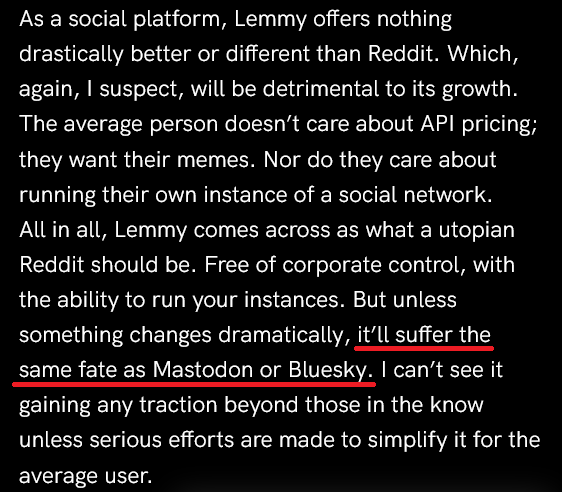Search
Items tagged with: reddit
It's been interesting reading this #reddit thread. People are understandably upset about the prospect of #youtube showing ads during the pause screen. Lots of people threatening to leave YouTube, but at the end of the day, most won't.
There are alternatives. I've been running #tilvids for over 4 years now. We have great content creators like @thelinuxEXP sharing content. All people have to do is actually start voting with their eyeballs...
https://www.reddit.com/r/technology/comments/1fkbjtk/youtube_confirms_your_pause_screen_is_now_fair/
#tech #Technology #google
Just as we all knew all along, #Reddit’s move to charge exorbitant fees for API access was so they can cut lucrative deals to sell user-created material to train #AI models.
I was a redditor of about 15 years when I decided to delete everything I wrote and close my account because I foresaw this hostile repurposing of what is essentially a massive store of freely-accessible, context-rich community-generated content, made by people who didn’t necessarily want their content to be used for training without compensation.
AI training is largely built on top of exploitation of labor for private gain. It’s legal in many cases, but it’s often unethical and immoral.
“Reddit Signs AI Content Licensing Deal Ahead of IPO”
No-paywall version here: https://archive.ph/caW1Y

Reddit Is Said to Sign AI Content Licensing Deal Ahead of IPO
Reddit Inc. has signed a contract allowing a company to train its artificial intelligence models on the social media platform’s content, according to people familiar with the matter, as it nears the potential launch of its long-awaited initial public…Amy Or (Bloomberg)
https://www.windowscentral.com/software-apps/googles-going-to-scrape-the-entire-public-internet-to-train-its-ai-tools-and-theres-nothing-we-can-do-about-it
#technology #tech #technews #bot #reddit #tech_news

Google's going to scrape the entire public Internet to train its AI tools and there's nothing we can do about it
The gatekeepers of online content doing what everyone expected.Richard Devine (Windows Central)
Looking for a Reddit alternative? Lemmy tell you, they currently kinda suck
I tried out a growing Reddit alternative, Lemmy, for a week, and its clear that federated apps aren't ready to replace Reddit yet.Dhruv Bhutani (Android Authority)
Basically nobody goes to a concert because of the owner of the stage. They go because of the music happening on the stage.
Building a functional stage on the internet is now relatively cheap and easy thanks to the #fediverse.
These mindsets are, to my mind, almost antiquated looking now.
I have gone ahead and created a new #firefox community on fedia.io - https://fedia.io/m/firefox
Check it out (or not).
Firefox - Fedia
The latest news and developments on Firefox and Mozilla, a global non-profit that strives to promote openness, innovation and opportunity on the web....fedia.io
reddit: indefinite #blackout until reddit acts
https://old.reddit.com/r/ModCoord/comments/148ks6u/indefinite_blackout_next_steps_polling_your/

Indefinite Blackout: Next Steps, Polling Your Community, and Where...
On May 31, 2023, Reddit announced a policy change that will kill essentially every third-party Reddit app now operating, from...reddit
💪🏿💪🏾💪🏽💪🏼💪🏻
I had hoped that #Mastodon would be the thing that could replace both Reddit and Twitter, but without a federated #groups model, or proper #threading, or similar tools, it's not going to work.
So where y'all going?
Not the first huge player clamping down on it's API killing off 3rd party apps and burning bridges. This seems to be the nature of silos (or so called walled gardens).
If only there would be a solution to this dilemma. Something interoperable. Ideally without an API at all.
Like #microformats and #Webmention|s or #RSS|json|atom feeds.
Ah well, #ActivityPub will do for now 🤓
Re-inventing the federated wheel because you don't know that wheels exist

- Fediverse.Party - explore federated networks
Let's make social media free, federated and fun! Fediverse.Party is your guide into the world of decentralized, autonomous networks running on free open software on a myriad of servers across the world. No ads and no algorithms.fediverse.party
#Mastodon #Pleroma #GNUsocial #HubZilla - like #Twitter
#Friendica #MissKey - better #Twitter and #Facebook
#Lemmy - like #Reddit
#WriteFreely #Plume - #Medium and #WordPress
#BookWyrm #Inventaire - like #Goodreads
#PixelFed #PeerPx - like #Instagram
#PeerTube - like #YouTube and #Vimeo
#Owncast - live streaming
#Funkwhale - like #Spotify and
#SoundCloud
#Mobilizon - like #MeetUp
#distbin - like #Pastebin
#Nextcloud - like #Dropbox, #Onebox, #GoogleDrive
#Friendica - better #Facebook
#Funkwhale - like #Spotify and #SoundCloud
#Lemmy - like #Reddit
#PixelFed and #PeerPx - better #Instagram
#PeerTube - like #YouTube and #Vimeo
#Mastodon and #Pleroma - better #Twitter
#BookWyrm and #Inventaire - like #Goodreads
#distbin - like #Pastebin
#MissKey - better #Twitter and #Facebook combined
#Nextcloud - better #Dropbox, #Onebox, #GoogleDrive
#Owncast - live streaming
#WriteAs and #Plume - #Medium and hosted #WordPress on steroids
https://status.fastly.com/
Investigating - We're currently investigating potential impact to performance with our CDN services.
https://itsfoss.com/mainstream-social-media-alternaives/ #itsfoss




